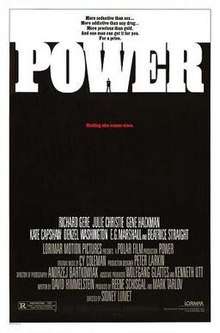Power (1986 film)
Power is a 1986 American political drama film directed by Sidney Lumet and starring Richard Gere. The original screenplay by David Himmelstein focuses on political corruption and how power affects both those who wield it and the people they try to control.
| Power | |
|---|---|
 Theatrical release poster | |
| Directed by | Sidney Lumet |
| Produced by | Reene Schisgal Mark Tarlov Kenneth Utt Wolfgang Glattes |
| Written by | David Himmelstein |
| Starring | |
| Music by | Cy Coleman |
| Cinematography | Andrzej Bartkowiak |
| Edited by | Andrew Mondshein |
Production company | Lorimar Productions |
| Distributed by | 20th Century Fox |
Release date |
|
Running time | 111 minutes |
| Budget | $14 million[1] |
| Box office | $3,800,000[2] |
Denzel Washington's performance in the film as public relations expert Arnold Billings earned him the 1987 NAACP Image Award for Outstanding Supporting Actor in a Motion Picture. Beatrice Straight's performance as Claire Hastings earned her a Golden Raspberry Award nomination for Worst Supporting Actress.
Plot
Pete St. John (Richard Gere), a ruthless and highly successful media consultant, is juggling a couple of political candidates when he is asked to join the campaign of wealthy but little-known businessman Jerome Cade (J.T. Walsh), who hopes to win the Senate seat being vacated by St. John's friend Sam Hastings (E.G. Marshall).
St. John comes into conflict with Arnold Billings (Denzel Washington), a public relations expert whose firm Cade has hired. St. John's investigation into Cade's background prompts Billings to retaliate by bugging St. John's office phones, flooding the basement of his headquarters, tampering with his private jet, and interfering with his other clients.
These actions force St. John to examine himself and what he has become and to decide whether his ex-wife Ellen Freeman (Julie Christie) and his former partner Wilfred Buckley (Gene Hackman) are right in believing that his success is due primarily to the exploitation of others.
Cast
- Richard Gere as Pete St. John
- Julie Christie as Ellen Freeman
- Gene Hackman as Wilfred Buckley
- Kate Capshaw as Sydney Betterman
- Denzel Washington as Arnold Billings
- E.G. Marshall as Senator Sam Hastings
- Beatrice Straight as Claire Hastings
- Fritz Weaver as Wallace Furman
- Michael Learned as Governor Andrea Stannard
- J.T. Walsh as Jerome Cade
- Matt Salinger as Phillip Aarons
Critical reception
In his extremely negative review of Power in The New York Times, Vincent Canby described the film as "a well-meaning, witless, insufferably smug movie that...suffers from the total lack of a comic imagination."[3]
However, in his much more favorable review of Power in the Chicago Sun-Times, Roger Ebert wrote "It's smart, it's knowledgeable, sometimes it's funny, occasionally it is very touching, and I learned something from it...The movie builds up considerable momentum during its first hour. There's a sense of excitement, of identification with this man who is being driven by his own energy, ambition and cynicism...During the second half of the movie, however, a growing disappointment sets in. Power is too episodic. It doesn't really declare itself to be about any particular story, any single clear-cut issue...the movie itself seems to sense that it's going nowhere. The climax is a pointless, frustrating montage of images. It's a good montage, but it belongs somewhere in the middle of the movie; it states the problem, but not the solution or even the lack of a solution. The movie seems to be asking us to walk out of the theater shaking our heads in disillusionment, but I was more puzzled than disillusioned."[4]
On Rotten Tomatoes, it has 50% score. Metacritic also gives the movie a 50% score, indicating "mixed or average reviews".
See also
References
- "The Unstoppables". Spy. November 1988. p. 92.
- "Power (1986) - Box Office Mojo".
- Canby, Vincent (31 January 1986). "SCREEN: 'POWER,' BY SIDNEY LUMET" – via NYTimes.com.
- Ebert, Roger. "Power Movie Review & Film Summary (1986) - Roger Ebert".
External links
- Power on IMDb
- Power at Rotten Tomatoes